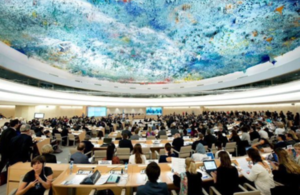Human Rights Council 31, Geneva: UK Statement on Freedom of Religion or Belief, 9 March 2016
UK Statement for the Interactive Dialogue with the Special Rapporteur on Freedom of Religion or Belief.

The Human Rights Council takes place at the Palais des Nations in Geneva
Thank you Mr President.
We would like to thank the Special Rapporteur for his report which helpfully explains why freedom of religion or belief and freedom of expression are not in opposition to one another but rather are inter-linked and mutually reinforcing.
The UK fully subscribes to this understanding. The right to freedom of religion or belief does not protect any particular religion or belief system from criticism. The human rights holders are the individuals subscribing to a religion or belief, not the religions themselves. We also agree that freedom of expression should only be restricted where this infringes directly upon “public safety, order, health, or morals or the fundamental rights and freedoms of others”. We call on states to repeal blasphemy laws which often fuel intolerance and are misused to persecute others on the basis of their religion or belief.
A current concern many of us share is how to prevent extremism. We would argue that in societies where both freedom of religion or belief and freedom of expression are respected, it is much harder for extremist views to take root. If individuals can freely practice their religion, share it, change it or follow no religion, we expose as intolerant a worldview which says that individuals who do not share that view are inferior and a legitimate target for attack.
We have two questions:
What is the Special Rapporteur’s involvement in the work to take forward the UNSG’s Action Plan on Preventing Violent Extremism?
How will the Special Rapporteur ensure that UN member states take action to tackle the root causes of extremism? What can be done to ensure that intolerance against others on the basis of their religion or belief is not legitimised through education, legal systems, law enforcement and other agencies of the state?